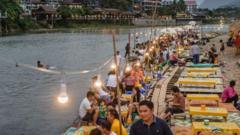Recent incidents in Laos, where suspected methanol poisoning has resulted in the deaths of five tourists, have intensified scrutiny of the region's unregulated alcohol supply. Among the deceased are a British woman, an Australian woman, a US man, and two Danish nationals, with another Australian currently in critical condition. Investigations are ongoing, but there are strong indications that the victims consumed drinks contaminated with methanol, a poisonous alcohol often found in illicit beverages.
Methanol poisoning is a long-standing issue in Southeast Asia, particularly in economically disadvantaged areas along the Mekong River. Despite existing government warnings regarding alcohol consumption, awareness remains low among backpackers and party-goers visiting popular tourist destinations.
Methanol, which is colorless and odorless, can be challenging to detect in alcoholic beverages. Victims may not exhibit symptoms immediately; typical signs such as nausea and abdominal pain can take up to 24 hours to manifest. If untreated, the fatality rate can range from 20% to 40%, depending on the methanol concentration ingested.
Southeast Asia reportedly holds the highest prevalence of methanol poisoning in the world, with major outbreaks occurring in countries like Indonesia, India, and Cambodia. Indonesia is identified as a hotspot due to widespread illegal liquor production and consumption. In locations like Vang Vieng, a prominent tourist hub in Laos, the economy thrives on tourism, characterized by numerous bars, restaurants, and hostels. However, underfunded law enforcement coupled with minimal food and alcohol regulatory constraints exacerbates the issue of methanol contamination.
Dangerous practices include the production of counterfeit alcoholic beverages using methanol for profit, as local sources indicate that some producers opt for cheaper methanol to increase the potency of lower-quality drinks. According to a Western diplomat familiar with the region, while the situation is complex, it is typically not the bar owners who intend to harm tourists, but rather the systemic issues relating to production and regulation.
Addressing this pressing concern, experts believe a substantial awareness campaign is essential to alert tourists about the risks of consuming bootleg alcohol. Recent high-profile incidents may catalyze further education efforts, though a comprehensive strategy is required to tackle the root causes of methanol-related health risks.
In response to these tragic events, several Western governments have updated their travel advice on alcohol consumption in the Southeast Asian region. Previous efforts to raise awareness about methanol poisoning have been made, such as an Australian initiative titled 'Don't Drink Spirits in Bali', which educates visitors about the dangers of mixed drinks. Given the complexity and scale of contamination in Southeast Asia, experts suggest that total abstinence is the most reliable method for tourists to protect themselves while traveling, given the difficulty of tracing the origins of the alcohol they consume.



















